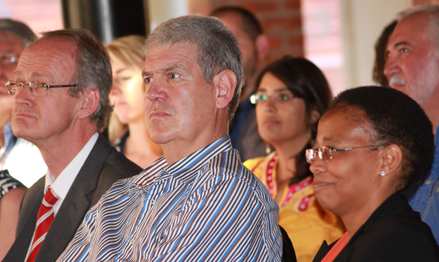|
 |
Attending the launch of the first Human Rights Desk were from left: Prof Teuns Verschoor, former Vice-Rector: Institutional Affairs, Dr Leon Wessels, human rights activist and lawyer, and Dr Choice Makhetha, Vice-Rector: External Relations.
Photo: Huibrecht Hoffman
22 October 2013 |
The university has created another beacon for social justice and reconciliation with the launch of its first Human Rights Desk (HRD) on the Bloemfontein Campus. The HRD, which falls under the Institute for Reconciliation and Social Justice, will promote, protect and monitor human rights at the university.
Speaking at the launch of the HRD, Prof Andre Keet, Director of the Institute for Reconciliation and Social Justice, said the desk will investigate reported violations of human rights on campus. "It will investigate any cases that require investigation, as well as various other projects that serves the university and national and international imperatives as far as human rights is concerned.”
Prof Keet told students and staff in attendance that the desk is an expression of the university's commitment. "As a university, we have to own this particular desk, as a collective entity we should make it work and be proud of it. Our task is to build a new form of productivity into the language of rights, and build a culture of human rights among our students, which we can already see emerging."
Also speaking at the event, Prof Jonathan Jansen, Vice-Chancellor and Rector, said the HRD will be a place where people can come who are hurt. He encouraged students to speak on human rights anywhere in the world. "I want you to think of yourself as a borderless human being, for human rights are not geographically confined. I want you to also hurt when somebody in a mall in Kenya gets hurt."